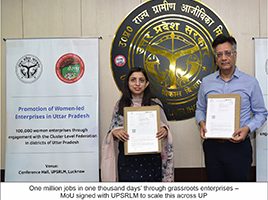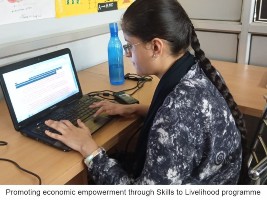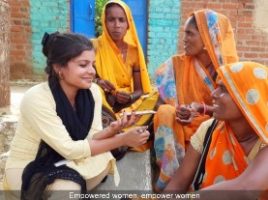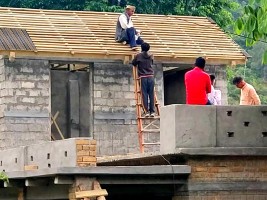Women-Led Micro Movements: Shaping the Future of Work

Sixty-seven per cent of India’s 1.4 billion population is in the working age group, and over 100 million young women and men are expected to seek gainful employment by 2030. However, the nation is close to facing an employment crisis, as the market is ill-equipped to absorb them. Despite being one of the fastest-growing economies in the world, India struggles with significant sectoral imbalances and a lack of job opportunities in villages, small towns, and peri-urban areas. This situation confines millions in cycles of low-income, undignified work.
Women and youth, who could make up half of the workforce, remain critically underrepresented in the jobs market and entrepreneurial ventures due to systemic barriers. Meanwhile, India’s youth, particularly in rural areas, grapple with skill mismatches, limited market access, and a lack of local employment options. If these challenges are left unaddressed, they could lead to economic stagnation, deepen social inequities, and result in missed opportunities for inclusive growth.
We view inclusive entrepreneurship, or ‘SAMUDYAM’, as a vital driver of innovation, job creation, and economic growth. This approach empowers ‘job seekers’ to transform into ‘job makers’. To enhance the green economy, our approach is focused on unlocking the potential of women by building their capacities and creating supportive ecosystems through social innovation.
Our approach at Development Alternatives (DA) prioritises inclusivity and environmental well-being by offering grassroots solutions that empower women and promote sustainable development. Women play a crucial role in the sustenance and development of communities, which is rooted in solidarity and a deep understanding of agency—both its presence and absence. They are uniquely placed in the evolution of ecosystems that support both people and nature. There is undeniable wisdom in how women operate; they know what it means to ‘replenish’ as opposed to ‘depleting’ resources, which also informs their commitment to more sustainable use of resources. These capabilities stem from their lived experiences, particularly in rural and resource-dependent communities.
At DA, we look at economic growth through a lens that places women at the centre of designing processes that engineer systemic shifts in local entrepreneurship and employment landscapes. As we pursue this approach, we recognise the importance of growth being scalable, sustainable, and relevant to the diversity of India.
Women tend to prioritise long-term community benefits over short-term gains. After years of working in the field of women-led entrepreneurship, we have observed that women, both individually and collectively, are enthusiastic about adopting energy-efficient methods, water conservation practices, sustainable farming techniques, and waste reduction strategies, particularly when these new opportunities enhance their incomes and bring benefits to their families and community.

Women and youth constitute more than half of the working-age population and yet only one in five enterprises are run by women. Lack of family support has emerged as one of the strongest reasons for the unequal participation of women in entrepreneurial ventures. Women excel in managing resources sustainably and almost 40% of young women aspire to own a business in rural India but succumb to gender barriers such as lack of societal support, resources, and self-confidence. Furthermore, a lack of entrepreneurial and management skills, inadequate infrastructure, and poor marketing channels inhibit the existing enterprises from becoming profitable.
Aspiration-driven entrepreneurship, as opposed to subsistence-based income generation activities, has gained considerable recognition in the economy and the Indian society at large. Over the years, grassroots entrepreneurship has emerged as a response to the changing paradigm of employment in the country. It offers an avenue for local, opportunity-driven, and dignified employment, especially for women and youth, who have been the most vulnerable to macroeconomic shocks.
Deep listening sessions lay a solid foundation for initiating the process of social innovation and systemic change. By listening to communities, we gain insights for prototyping for entrepreneurship and build collective intelligence that leads to the co-creation of ‘systemic prototypes’–processes driven by local stakeholders that unlock new opportunities and resources with which they can be tapped. The impact of adopting a social innovation approach and co-creating processes is evident in the stories shared in this edition of the newsletter.
More irrefutable evidence can also be found in the survival rate of enterprises set up by DA and our partners. In Uttar Pradesh, for example, over 90% of the businesses set up by women continue to grow after three years. Currently, over 1600 enterprises are being established across 15 development blocks in 5 districts every month, creating more than 3000 new jobs. If this trend continues nationwide, approximately 2 million people every year could find employment in a new green and inclusive rural economy.
Women are no longer receivers of ‘innovation’ but co-conspirators in activating an ecosystem where their role as innovators and entrepreneurs becomes embedded in society.
The views expressed in the article are those of the authors and not necessarily those of Development Alternatives.
This blog first appeared as an editorial in Development Alternatives Newsletter December, 2024 https://devalt.org/newsletter/56






Leave a Reply